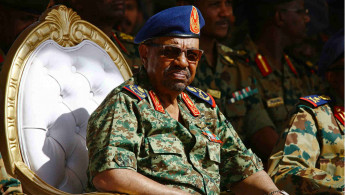ICC: Failure to arrest Sudanese president undermines global justice
Fatou Bensouda also criticised the UN Security Council, saying it has failed to take action against Omar al-Bashir and others accused of crimes against humanity and war crimes in Darfur during fighting since 2003, or to act against nations that fail to carry out arrests.
She said the court's judges have ruled that the failure of ICC members to apprehend Bashir and others sought by the tribunal clearly violates the Rome Statute that established the ICC.
Bensouda said Monday's court decision that Jordan failed to comply with its obligation as an ICC member to arrest Bashir in late March underscored the requirement of the 123 countries that are parties to the Rome Statute to arrest and hand over all those sought by the tribunal.
It found that Bashir's immunity as a head of state under customary international law does not bar ICC parties from executing an arrest warrant and decided to refer Jordan's noncompliance to the Security Council and the assembly of the 123 ICC parties, which is currently meeting at UN headquarters in New York.
Bensouda criticised the Security Council for refusing to take action on previous referrals and requests, saying this "only serves to embolden others" to invite Bashir to their countries.
They are "safe in the knowledge that there will be no consequences from this council for such breaches," she said.
ICC and selective warrants
The ICC first issued an arrest warrant for Bashir in 2009 on five counts of crimes against humanity, two counts of war crimes, murder, rape and torture and says Bashir's arrest is crucial to international peace and justice.
Yet the ICC has not issued arrest warrants against other world leaders who have allegedly committed war crimes and been accused of violating international law.
These incluide Israeli Prime Minister Binyamin Netanyahu, who is currently spearheading a siege on the Gaza Strip with the Palestinian Authority and Egypt. The UN says the blockade will make the enclave uninhabitable by 2020, while some rights groups say it is already uninhabitable.
Netanyahu's government is also actively endorsing the building of settlements in the occupied West Bank, which are considered illegal under international law.
The ICC has also failed to issue an arrest warrant for Syrian President Bashar al-Assad who is accused of violently suppressing peaceful protests in 2011 and triggering an armed rebellion, which plunged the country into a now seven-year-long civil war.
The brutal tactics pursued mainly by the Assad regime, which have included the use of chemical weapons, sieges, mass executions and torture against civilians have led to calls for war crimes investigations.





 Follow the Middle East's top stories in English at The New Arab on Google News
Follow the Middle East's top stories in English at The New Arab on Google News
![22 Arab countries at COP29 have rejected the targeting of fossil fuels [Getty]](/sites/default/files/styles/image_330x185/public/2024-11/GettyImages-2184289638.jpg?h=199d8c1f&itok=ptHl5bec)
![Dozens of people turned out for the funerals [Getty]](/sites/default/files/styles/image_330x185/public/2024-11/GettyImages-2185229760.jpg?h=e7c891e8&itok=1bctDcE6)
![The UAE is widely suspected of arming the RSF militia [Getty]](/sites/default/files/styles/image_330x185/public/2024-11/GettyImages-472529908.jpg?h=69f2b9d0&itok=Yauw3YTG)